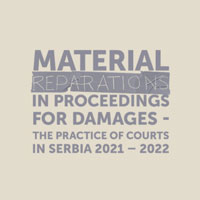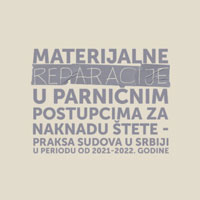Material reparations in proceedings for damages – The practice of courts in Serbia 2021 – 2022
 For a long time, the Humanitarian Law Center (HLC) has been publishing reports on the exercise of the right to compensation for victims of war crimes, through civil proceedings conducted before the courts in Serbia. The last such report covered the period from 2017 to 2020 and was presented to the public in 2021. This report covers the period from 2021 to the end of 2022.
For a long time, the Humanitarian Law Center (HLC) has been publishing reports on the exercise of the right to compensation for victims of war crimes, through civil proceedings conducted before the courts in Serbia. The last such report covered the period from 2017 to 2020 and was presented to the public in 2021. This report covers the period from 2021 to the end of 2022.
The obligation of the Republic of Serbia to provide redress to victims of human rights abuses, including in the form of adequate material reparations, remains unchanged. The harm inflicted on individuals and their family members implies the duty of the wrongdoer, the Republic of Serbia in this case, either to remove its harmful effects or to provide the victims with adequate redress. 30 years since the outbreak of the armed conflicts in the territory of the former Yugoslavia, the Republic of Serbia has not yet fully met this obligation. The political will to face and accept responsibility for past crimes and provide redress to all victims is still absent. As a result, the victims and their family members are forced to pursue their compensation claims through lengthy, costly and often uncertain civil litigation before the courts in Serbia.
The approach of the authorities of the Republic of Serbia has many harmful consequences for victims. They are forced to testify repeatedly before the courts about the crimes committed; secondary victimisation has become the norm; the costs of court proceedings are very high, which puts an additional burden when it comes to access to justice upon those who have clearly acquired the status of victim; and in some cases, the proceedings can last almost a decade. Furthermore, the courts and the state rarely treat victims in a friendly manner, the burden of proof rests on the victims, the standard of proof is too high, and the provisions of substantive law, especially those relating to the statutory limitations for asserting the right to compensation, are always interpreted in a manner that is harmful to victims where there is no final judgment of conviction in a war crime case. This series of burdens placed on victims who have already been recognised as victims acts as a deterrent, and makes victims give up on the idea of filing a law suit to pursue compensation against the Republic of Serbia.
A lack of willingness on the part of the Republic of Serbia to accept its responsibility for past crimes is also reflected in the award of derisory non-pecuniary damages, minimising or glossing over the role and responsibility of state authorities for past crimes, and precluding victims from Kosovo from collecting damages awarded by Serbian courts by refusing to recognize their personal identification documents issued by Kosovo institutions. In this way, the Republic of Serbia further discourages the victims from exercising their legal right to receive compensation.
This report is based on the numerous court decisions available to the HLC in compensation proceedings which injured parties issued against the Republic of Serbia. Other sources include the case law available from public databases posted on the official websites of the courts, as well as HLC’s previous reports and publications.







